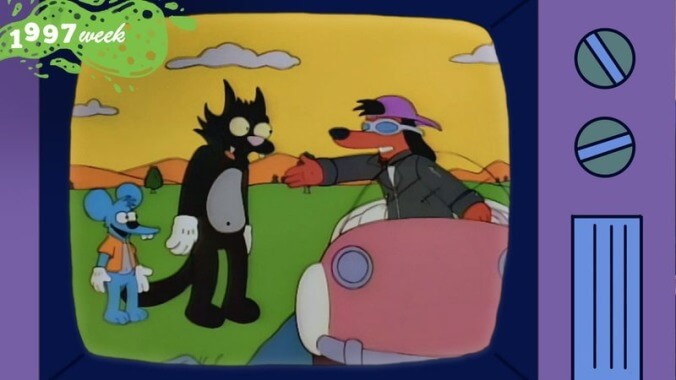“The Itchy & Scratchy & Poochie Show” gave us a totally outrageous paradigm


Once in a great while, we are privileged to experience a television event so extraordinary, it becomes part of our shared heritage. And in receiving these gifts, by grace of our noble human character, we are given license to say, eh, they’re not so great, then begin nitpicking the shit out of them. Such is our passionate, prickly relationship with television (teacher, mother, secret lover) and with pop culture as a whole: Ardor becomes ownership, familiarity breeds contempt, and the things that entertain us, enrage us when they have the audacity to change—or worse, when they stay exactly the same for long enough that it just gets stale. And rest assured that, when they do, we are on the internet within minutes, registering our disgust throughout the world.
As it has so many things, The Simpsons gave us an entire vocabulary to talk about this uneasy dance, and remarkably, it did it with a single episode. “The Itchy & Scratchy & Poochie Show” premiered on February 9, 1997, but chances are (especially if you’re an A.V. Club reader), you’ve heard a line quoted or concept referenced nearly every day in the 20 years since. There are lots of Simpsons quotes applicable to almost any situation, of course, no matter how narrowly defined; with 600-plus episodes of dialogue banked, the show is practically nearing the sentience of any sophisticated artificial intelligence, and may soon be able to respond fluidly to anything you throw at it. But it’s amazing how endlessly adaptable “Poochie” has been, specifically, particularly within the realm of pop culture (which is, after all, the only place where you and I exist).
It’s even more amazing, then, to consider that “Poochie” was The Simpsons’ bluntest commentary on the anxiety over its fading relevance. Prior to the show’s eighth season—where “Poochie” would put it over The Flintstones’ record for longest-running prime-time cartoon—Fox executives, who apparently never saw The Flintstones’ “Great Gazoo” episodes, suggested that Simpsons producers create a new character, one who would move in with the family permanently and really shake things up. In response, the show once more turned to Itchy & Scratchy, frequent outlet for all its industry inside jokes, and proceeded to ruin the “Cousin Oliver” trope for good. In fact, The Brady Bunch’s train-wrecking towheaded tyke has almost entirely been supplanted in the go-to reference book by The Simpsons’ passive-aggressive invention, Poochie The Rockin’ Dog.
Yet “Poochie” endures because it satirizes not just those TV conventions, but the entire process by which art is manufactured, consumed, and shat upon. In doing so, it’s given us so many ways to express distaste for the rote unoriginality of it all, mostly by recycling lines from a 20-year-old show. Has there even been a more apt summary of the desperate attempts to chase and monetize “cool” than the scene where executives urge the Itchy & Scratchy team (modeled after The Simpsons staff) to give them a dog “who gets ‘biz-zay!’ Consistently and thoroughly”? Or of all the self-indulgent wheel-spinning that pads out many a superhero blockbuster or prestige drama series than “When are they going to get to the fireworks factory?!” Or of the clumsy yet gratifying exit of an obnoxious character, whether fictional or real, than “Poochie died on the way back to his home planet?” Judging by the comments around here, no.
Although it’s cynical about the ends, “Poochie” also fosters some genuine sympathy for those stuck figuring out the means. The Itchy & Scratchy staff dutifully plows ahead on figuring out how to “rasta-fy him by 10 percent or so,” knowing that questioning the executives’ meaningless buzzwords will only get them fired. Meanwhile, Roger Meyers Jr. is forced to figure out how to make his cartoon more appealing to fickle yet demanding—and stupid—viewers who “want a realistic, down-to-earth show… that’s completely off-the-wall and swarming with magic robots.” Caught in the middle are people like voice actor June Bellamy (an affectionate stand-in for the late June Foray) and Homer himself, who just wants to please the audience and “make them laugh and cry until we grow old together.” It’s a tricky balance to acknowledge that behind every “soulless by-product of committee thinking,” there are also people with actual dreams and good, artistic intentions without coming off as mawkish or condescending. “Poochie” manages to engender a twinge of compassion for all involved, even if they’re uniting behind a rapping dog.
Still, the episode’s most lasting contribution to our pop cultural dialogue is in its portrayal of the people who receive these noble, if understandably flawed creations, then ruthlessly tear them apart. By 1997, The Simpsons wasn’t just facing criticism from professional critic types who were waiting impatiently, like Kent Brockman says here, “for cracks to appear in the show’s hilarious façade.” It was also in the early stages of its tense alliance with the internet—primarily through the dedicated denizens of the alt.tv.simpsons newsgroup, whose users had already spent most of the show’s run pointing out errors in consistency and offering hyperbolic, knee-jerk raves or pans, all in order to delude themselves into thinking that they were part of the show. Guys like this fucking nerd:
Yes, as an 18-year-old technical man who spent all his time watching a kids’ cartoon show, then arguing with strangers about the “Best Nelson Lines,” I was quite evidently thrilled to see my efforts finally get some recognition here in the form of those pathetic dorks who hassle Homer and June about magic xylophones. My excitement was shared by my fellow geniuses at work (most of them, anyway), who similarly loved that The Simpsons writers were calling us—us!—annoying asshats. They really do care!








































